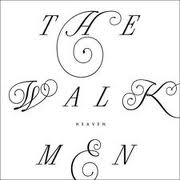
The Walkmen
Heaven
(Fat Possum; 2012)
By David M. Goldstein | 14 June 2012
“Walkmen records always bore me for the first month, then they’re all I listen to for the next two.”
That quote courtesy of CMG editor-at-large Aaron Newell, a smart guy who, despite his chosen profession as an attorney, tells the truth at least eighty percent of the time. And he nailed this one. I was essentially prepared to write off the Walkmen’s latest album as uncharacteristically dull and far too mellow for its own good; surely the result of what happens when your frontman takes up residence in a two bedroom condo in the leafy, unscary part of Brooklyn (and if you don’t know, know you know). Except now I can’t go five minutes without wanting to listen to the triumphant, six-note trill towards the end of “Nightengales,” often whistling it when my headphones are unavailable. Yeah, Heaven is a grower—but as Newell has properly pointed out, so is every Walkmen album.
Heaven has also been accompanied by a level of pre-release hype the likes of which this band hasn’t experienced since Bows & Arrows (2004). THIS, billed as their sweeping Americana album, will finally be the record to elevate them to a level of fame akin to that of the National or Grizzly Bear. Heaven was recorded in the Pacific Northwest with Phil Ek, and even Fleet Foxes’ Robin Pecknold was enlisted on backing vocals for the key beard that all Walkmen members are unwilling (or unable) to grow. Albums like After the Gold Rush (1970) and Music from Big Pink (1968) had been invoked, with “Heaven” said to have been the only title worthy of a record with such sweep.
Except that in reality Heaven is more like a classic Sunday morning album: a modest, extremely laid back paean to the comforts of domesticity in which every song sounds like it was recorded from a rocking chair. And it’s this aspect of Heaven that takes the most getting used to, namely the fact that it has fewer tempo changes than the last Beach House album. Matt Barrick, easily one of indie’s most accomplished drummers, simply isn’t given much to do here, and even when he is pounding the skins, like on “Heartbreaker” and “The Love You Love,” probably the two most Walkmen™ songs here, Phil Ek has him mixed low to the point of being nearly inaudible.
The Walkmen’s formidable rhythm section clearly takes a backseat to Hamilton Leithauser’s vocals, and Paul Maroon’s guitar, which while still plenty reverberated, features more Peter Buck-like jangle than usual, in keeping with the sunny outlook. Heaven is quite possibly the first Walkmen album that could not be accurately described to be soaked in brown liquor, and not coincidentally the first in ages without any waltzes, fortunate because with the twin beautiful bummers of You & Me (2008) and Lisbon (2010), they’d really taken horn-laden dirges in 3/4 as far as they could possibly go. Leithauser turns in the warmest, most inviting vocals of his career, as he sings of both fidelity (“We Can’t Be Beat”) and what would appear to be life lessons to his infant daughter (“Song for Leigh”). Then there’s the frankly spell-binding “Line by Line,” a song consisting of little more than a picked guitar line and Leithauser’s voice, deriving all of its drama from swells in volume and key changes. It’s the rare Walkmen song that actually sounds indebted to Talk Talk, with a vocal melody akin to a Hebrew prayer.
Memorable bits unquestionably emerge with repeated listens: the triumphant trilling to close out “Nightengales,” Leithauser’s hum-worthy vocal melody on “Love is Luck,” the heavy-lidded doo-wop shuffle of penultimate track “No one Ever Sleeps.” But the fact still remains that regarding both tempos and rhythms, in their efforts to lay back the Walkmen have swung the pendulum too far in the opposite direction. This is especially reinforced by the title track, a downright sprightly 4/4 jaunt with forward propulsion and a prominent drum track—Technicolor to the point where it sounds like it belongs to an entirely different album.
And it’s ultimately this lack of oom-pah-pah that keeps Heaven, though plenty accomplished, shy of the upper echelons of Walkmen albums (Bows & Arrows and especially You & Me). It’s understandable that between seven albums, ten years of touring, and families, they’d want to slow things down, but now fall prey to making music reserved for men twice their age. The percentage at the top of the page is still at least seven points higher than it was a month ago, and both the band’s skill with slow-burning melodies and the richness of Leithauser’s lower register are without peer. But a little more drive next time out will be necessary. The Walkmens’ many children will mature in the inevitable next two years between albums, shouldn’t they want to see daddy kick a little ass?





